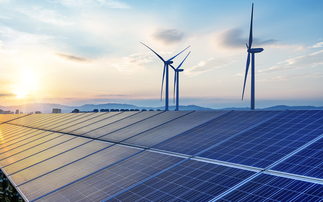Gender diversity should be at the beating heart of the low-carbon transition, argues RenewableUK's Alicia Green
Last month, I walked over to Parliament Square to witness the school climate strikes. It was inspiring to see the passion of today's youth as they vocalised the urgency in protecting our planet and driving significant change for the better. What's more, the social impetus of some of these school children, such as Greta Thunberg - the 16-year-old climate warrior from Sweden - is reassuring and refreshing, for these activists will be the leaders of tomorrow.
Speaking out on Twitter on International Women's Day, Thunberg struck a chord with me. She highlighted that tackling climate change fits hand-in-hand with encouraging greater representation of women - a key aspiration of the UN's Sustainable Development Goals (SDGs). 'The more I read about the climate crisis the more I realise how crucial feminism is. We can't live in a sustainable world unless all genders and people are treated equally', she exclaimed.
Part of building a sustainable world will be driven by the clean energy sector and women's voices behind the renewables revolution matter, because it is women and girls who will be disproportionally affected by the impacts of climate change. The majority of the world's poorest people tasked with securing water, food and fuel for cooking and heating for their families, are women. These women often lack access to renewables, meaning they do not have the social power to displace the carbon emitting resources they rely on - such as cookstoves - and create healthier homes for their families. It is their livelihoods that are at risk in the wake of the increased prevalence and severity of natural disasters. It is therefore clear that to help empower the world's women through SDG5 - the goal for gender equality - female voices will be needed.
Yet, between now and these young activists taking a seat on our Boards, we face a huge challenge in sustaining a pipeline of diverse perspectives and ideas within our workforce. The renewable energy sector may employ more women than the traditional energy sector (on average 32 per cent compared to 22 per cent), but the young age profile of the sector makes fast and substantial change difficult. A young workforce, as opposed to one where the age demographic is formed by a high proportion of employees reaching retirement, cannot easily increase diversity at all levels just through improved recruitment practices at entrant level. For instance, the UK offshore wind sector has an average workforce age of 38, meaning that in addition to bringing more women into the sector, more needs to be done to retain and promote women in the existing employee base.
At the top end of the scale, female representation is poor - only 14 per cent of the top UK energy companies have female directors and only six per cent of executive board seats are held by women. Improving these figures alone will be a challenge, given that nearly 40 per cent of leading energy companies do not have a large enough pool of female talent to progress to senior management. It makes commercial sense to do so however, given that diverse organisations perform better where varied ideas drive innovation and financial growth.
There is need for greater engagement at entrant level too, so that more women can become visible in these senior roles. By reaching out to girls still at school, we can help sustain the pipeline of talent and tackle the issue of uptake when it comes to more specialist and technical roles within the sector. Past the age of 16, only 35 per cent of females study STEM subjects (science, technology, engineering and maths) or a technical vocational qualification, compared to 94 per cent males, which helps explain why certain fields of our sector face poorer representation of women than others.
So, what can businesses, including those not directly in the energy space, do to attract women into the workplace, increase diversity, and ultimately contribute to collective empowerment of women across sectors in the fight against climate change? This is a complex question, with no simple answer, but learning from where positive change is already happening in the energy sector is a good start. Campaigns such as POWERful Women, EWiRE and The Wise Campaign, to name just a few, run networking events, mentoring and outreach programmes, which help shift the conversation to the value of a diverse workforce. At this beginning of this month, we also saw the announcement of the Offshore Wind Sector Deal which sets out an ambitious target for women in the workforce - an increase to 33 per cent (from 16 per cent today) by 2030 - and commitments to address systemic issues such as STEM engagement. Through these efforts and an emerging sector focus on diversity, we are starting to see change, with the UK employing 19 per cent women in renewables compared to the 10 per cent global average. Yet, beyond these initiatives more needs to be done within businesses. Progress is slow and we are far from accepting gender diversity within our workforce as normal.
More needs to be done through business practices and workplace conditions, to establish mechanisms that both attract and retain women in the workforce. In addition to policies on flexible working hours, equal pay, childcare support and maternity/ paternity leave, it is important to recognise that as the energy transition booms, young people will gravitate towards jobs that not only have a meaningful impact on society, but also prioritise diversity. SDG5 recognises the need to increase women's engagement in the workplace, and so as businesses we need to help ensure we are able to support the development of women's careers and empower our staff.
With STEM engagement, there is a need for businesses to provide girls with attractive career options and showcase their female leaders as role models. This should not be exclusive to female CEOs and women in senior positions, but should include women at all different stages of the career ladder. Here at RenewableUK, we recognised that inspiring girls and women at all levels is key to helping accelerate the transformation of our energy system. We therefore launched what we call the Switch List - a crowd-sourced database of women speakers from the energy sector - to help change how the energy sector is perceived at events and conferences. Giving conference organisers access to female speakers within the sector not only helps diversify conference panels but also gives women a platform to be role models for the next generation of professionals. Speaking opportunities also help women progress their careers, showcase the range of roles available in the sector and make female voices visible. In under a year, over 330 women from over 10 countries have signed up to the list and using this tool ourselves, women have on average made up 34 per cent of our in-house conference programmes.
As with facing climate change, we need to recognise the issue and help contribute to the solution, and the time to do so is now. We need to champion our inspirational women as part of leading this change towards a greener future, empowering them and girls to ensure that tomorrow's leaders are more diverse than ever before.
Alicia Green is policy analyst & Switch Project Coordinator at RenewableUK







